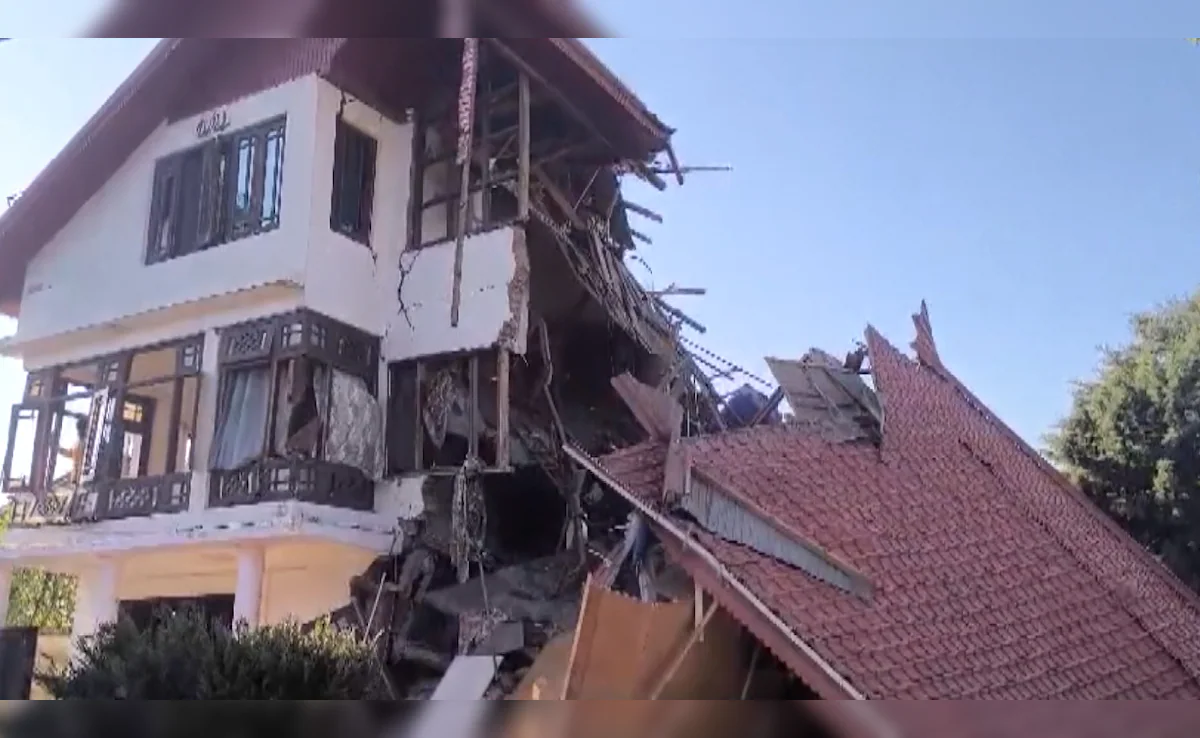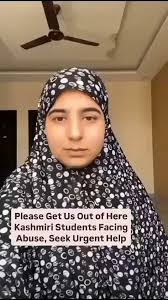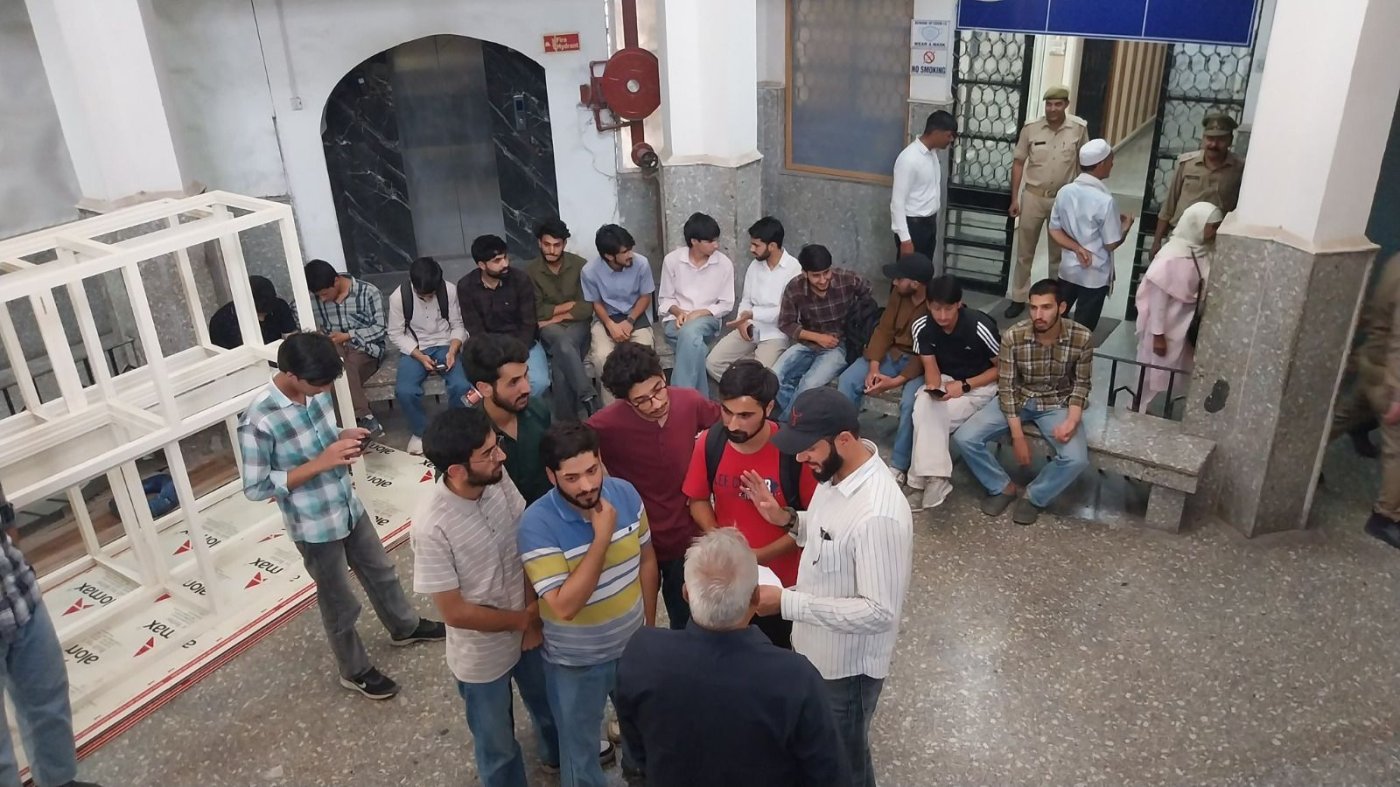'Terror isn't just in Kashmir': Kashmiri Students Facing Backlash After Pahalgam Attack

Following the devastating terrorist attack at Baisaran meadows in Jammu Kashmir's Pahalgam that claimed 26 lives and left several others injured on April 21, Kashmiris across India have found themselves once again trapped under the weight of suspicion and hate.
As violence broke out on the ground, a parallel storm brewed on social media — fuelled by anti-Kashmiri and anti-Muslim rhetoric — leading to brutal assaults, threats and emotional trauma for students and workers hailing from the Valley. In the country that promises unity in diversity, the Kashmiris are, once again, left to bear the collective guilt for an act they neither supported nor condoned.
“Like always, we are expected to apologise for crimes we did not even commit. Thousands of locals have been arrested, houses of mere ‘suspects’ — who have not even been proven guilty — are being destroyed and we are again placed on the hate radar,” said Uzair, a 25-year-old master's student at Jamia Millia Islamia.
“The Kashmir issue is older than I am, and I do not see it getting solved anytime soon. The outrage over the Pahalgam attack was necessary, but what about the aftermath?” he asked.
Uzair’s words echo the anxiety rippling through Kashmiri students across India. In Punjab, students from the Valley reported being physically assaulted by peers wielding sticks and knives. In Uttarakhand, the Hindu Rakshak Dal issued chilling threats, ordering Kashmiri students to leave or face violence. Despite police interventions, these incidents have spread fear far beyond the borders of Kashmir.
[caption id="attachment_451885" align="aligncenter" width="313"] A Kashmiri student in Chandigarh sent out a SOS[/caption]
A Kashmiri student in Chandigarh sent out a SOS[/caption]
“You cannot afford a regular life in a constant state of fear. I am thinking 24/7 about how to survive, and it affects all areas of my life, from personal to professional — whether it is college or relationships,” Uzair added.
He further said, “The locals helped and rescued the tourists, even risking their own lives. One of them was shot dead for it, and yet it is still us who are blamed. We have always lived in constant fear, amid heavy military presence and curfews. The most bloodshed in Kashmir has been that of Kashmiris. Still we are expected to apologise for the state’s failure to provide security and safety.”
Tensions peaked again on April 21 night in Janipur, Jammu, where protests erupted with chants of hate against Kashmiri Muslims. Eyewitnesses reported that students from Kashmir were targeted, harassed and beaten.
“I am safe nowhere — whether in Delhi or Kashmir — but at least in Kashmir, I will be with my family, who call me 25 times a day out of fear for my safety. I might even opt for compartment exams, as I don’t feel safe here,” said Umar, a final-year student who is considering leaving Delhi.
Jammu and Kashmir Chief Minister Omar Abdullah said on April 25 that his government is in contact with other state governments regarding these violent episodes.
“The J&K government is in touch with the governments of the states where these reports are originating from. I am also in touch with my counterparts in these states and have requested that they take extra care,” he stated.
#Chandigarh : Kashmiri student was assualted by a group of h!ndutva goons when he stepped out of his hostel after 3 days to buy some necessary food items in Chandigarh, Punjab. https://t.co/Y0QQO2HwQD
— Saba Khan (@ItsKhan_Saba) April 26, 2025
Helpline numbers have also been released to support Kashmiri students in distress.
For Faiza, a 21-year-old Jamia Millia Islamia student, the emotional toll has been severe.
“I live in the Jamia hostel, and ever since this incident, I rarely go out. Hearing about the harassment Kashmiri students are facing on social media has made me fearful that I could be next. As of now, I have not encountered any such incidents on campus, but the constant fear remains. What if something happens when I am out in the metro or in the market? Watching the hate against Kashmiris — who were not part of the attack and did everything they could to save lives — is heartbreaking. The media fails to highlight this, instead focusing on religious politics, which has jeopardised the safety of all Kashmiri students. I hope people realise this had nothing to do with students from Kashmir," she said.
On 27th evening, a female Kashmiri student at Jamia Millia Islamia was harassed at the campus entrance, gate no. 8. Reportedly, the incident happened in full view of the security guards. As per the students the accused was a relative of girls hostel staff.
This fear is not new. In 2019, after the deadly Pulwama attack that killed 40 security personnel, a nationwide campaign of harassment, eviction threats and physical assaults was launched against Kashmiris. That incident was later politicised and helped the ruling Bhartiya Janata Party (BJP) secure a resounding electoral victory. It was soon followed by the revocation of Kashmir’s semi-autonomous status — stripping the region of legislative rights and placing it under direct central control.
Shah Faiz, a student from Kupwara now studying in Delhi, shared his daily ordeal: “My family calls me two or three times a day to check if I am okay. After the Pahalgam attack, the security of Kashmiri students across India has become a major concern. I keep getting calls from my family every day, asking if I am safe or if anyone has said anything to me about it. Just the other day, I was out with a friend at a hospital. I was running late and had to book a cab, but I hesitated. I thought it might be dangerous, so I booked a more expensive ride instead. The fear is ever-present.”
[caption id="attachment_451887" align="aligncenter" width="1400"] Kashmiri students fearing their safety[/caption]
Kashmiri students fearing their safety[/caption]
Meanwhile, authorities in Kashmir have launched a controversial crackdown. In the days following the Pahalgam attack, at least seven residential homes across Pulwama, Shopian, Kulgam and Anantnag were demolished. Officials claim the homes belonged to militants involved in the attack. However, the demolitions occurred despite the Supreme Court’s recent verdict against such actions, ruling that the right to shelter is a fundamental right enshrined in the Constitution.
For students like Fareeza Lone, who studies at Delhi University, the trauma of being away from home during such times is both isolating and terrifying.
“When you are outside, situations like this are daunting. Just because you come from a certain place, you are suddenly under threat. Your entire identity — your being, your religion — becomes an accusation. It is terrifying. An identity that should make you proud now feels like something you want to hide. We are expected to feel guilty for a situation we had no part in,” she said.
Threats and attacks
A disturbing video emerged from Punjab showing a group of students from other states assaulting over a dozen Kashmiri students at a college in Lalru. Armed with sticks and knives, the attackers allegedly tore clothing, hurled abuses and beat the students mercilessly.
According to The Hindu, college authorities failed to intervene. The Jammu and Kashmir Students’ Association (JKSA) condemned the college administration for inaction. The police acknowledged the incident but offered few details, while the Dean of the Universal Group of Institutions (UGI), Vikas Sharma, dismissed it as a "usual fight".
Punjab’s Director General of Police Gaurav Yadav condemned the violence and warned against spreading hateful misinformation that could rupture communal harmony.
We have taken cognizance of a social media post by a student.
Local police have been directed to initiate appropriate legal action as per law. Any attempt to incite hatred, disturb communal harmony will not be tolerated.We appeal to all citizens to act responsibly on social…
— DGP Punjab Police (@DGPPunjabPolice) April 24, 2025
He urged restraint on social media and emphasised the need for unity.
In Uttarakhand, the Hindu Rakshak Dal circulated a video giving an ultimatum to Kashmiri students to leave the state or "face consequences".
An FIR was lodged against the group for hate speech. SSP Ajai Singh reassured the public that Kashmiri students’ safety would be prioritised, stating that the police had already contacted educational institutions to ensure students’ well-being.
He also confirmed that at least 25 inflammatory social media posts had been taken down to de-escalate communal tensions.
